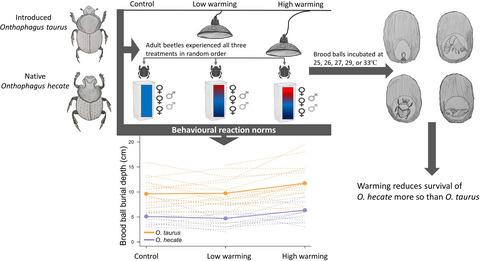当前位置:
X-MOL 学术
›
J. Anim. Ecol.
›
论文详情
Our official English website, www.x-mol.net, welcomes your feedback! (Note: you will need to create a separate account there.)
Behavioural responses to warming differentially impact survival in introduced and native dung beetles
Journal of Animal Ecology ( IF 4.8 ) Pub Date : 2020-10-28 , DOI: 10.1111/1365-2656.13366 Margaret A. Mamantov 1 , Kimberly S. Sheldon 1
Journal of Animal Ecology ( IF 4.8 ) Pub Date : 2020-10-28 , DOI: 10.1111/1365-2656.13366 Margaret A. Mamantov 1 , Kimberly S. Sheldon 1
Affiliation

|
BACKGROUND
Anthropogenic changes are often studied in isolation but may interact to affect biodiversity. For example, climate change could exacerbate the impacts of biological invasions if climate change differentially affects invasive and native species. Behavioural plasticity may mitigate some of the impacts of climate change, but species vary in their degree of behavioural plasticity. In particular, invasive species may have greater behavioural plasticity than native species since plasticity helps invasive species establish and spread in new environments. This plasticity could make invasives better able to cope with climate change. GOAL
Here our goal was to examine whether reproductive behaviours and behavioural plasticity vary between an introduced and a native Onthophagus dung beetle species in response to warming temperatures and how differences in behaviour influence offspring survival. METHODS
Using a repeated measures design, we exposed small colonies of introduced O. taurus and native O. hecate to three temperature treatments, including a control, low warming, and high warming treatment, and then measured reproductive behaviours, including the number, size, and burial depth of brood balls. We reared offspring in their brood balls in developmental temperatures that matched those of the brood ball burial depth to quantify survival. RESULTS
We found that the introduced O. taurus produced more brood balls and larger brood balls, and buried brood balls deeper than the native O. hecate in all treatments. However, the two species did not vary in the degree of behavioural plasticity in response to warming. Differences in reproductive behaviours did affect survival, such that warming temperatures had a greater effect on survival of offspring of native O. hecate compared to introduced O. taurus. BROADER IMPLICATIONS
Overall, our results suggest that differences in behaviour between native and introduced species is one mechanism through which climate change may exacerbate negative impacts of biological invasions.
中文翻译:

对变暖的行为反应对引进和本地蜣螂的生存有不同的影响
背景人为变化通常单独研究,但可能相互作用以影响生物多样性。例如,如果气候变化对入侵物种和本地物种的影响不同,气候变化可能会加剧生物入侵的影响。行为可塑性可能会减轻气候变化的一些影响,但物种的行为可塑性程度各不相同。特别是,入侵物种可能比本地物种具有更大的行为可塑性,因为可塑性有助于入侵物种在新环境中建立和传播。这种可塑性可以使入侵者更好地应对气候变化。目标 在这里,我们的目标是检查引入和本地食蚁兽蜣螂物种之间的生殖行为和行为可塑性是否因温度升高而有所不同,以及行为差异如何影响后代存活。方法使用重复测量设计,我们将引入的 O. taurus 和本地 O. hecate 的小菌落暴露于三种温度处理,包括对照、低温和高温处理,然后测量繁殖行为,包括数量、大小、和育雏球的埋藏深度。我们在它们的育雏球中饲养后代,其发育温度与育雏球埋藏深度相匹配,以量化存活率。结果我们发现引入的 O. taurus 产生了更多的育雏球和更大的育雏球,并在所有处理中将育雏球埋入比原生 O. hecate 更深的地方。然而,这两个物种在响应变暖的行为可塑性程度上没有变化。生殖行为的差异确实影响了生存,因此与引入的 O. taurus 相比,温度升高对本地 O. hecate 后代的生存影响更大。更广泛的影响 总体而言,我们的结果表明,本地物种和引进物种之间的行为差异是气候变化可能加剧生物入侵负面影响的一种机制。因此,与引入的 O. taurus 相比,变暖的温度对本地 O. hecate 后代的存活影响更大。更广泛的影响 总体而言,我们的结果表明,本地物种和引进物种之间的行为差异是气候变化可能加剧生物入侵负面影响的一种机制。因此,与引入的 O. taurus 相比,变暖的温度对本地 O. hecate 后代的存活影响更大。更广泛的影响 总体而言,我们的结果表明,本地物种和引进物种之间的行为差异是气候变化可能加剧生物入侵负面影响的一种机制。
更新日期:2020-10-28
中文翻译:

对变暖的行为反应对引进和本地蜣螂的生存有不同的影响
背景人为变化通常单独研究,但可能相互作用以影响生物多样性。例如,如果气候变化对入侵物种和本地物种的影响不同,气候变化可能会加剧生物入侵的影响。行为可塑性可能会减轻气候变化的一些影响,但物种的行为可塑性程度各不相同。特别是,入侵物种可能比本地物种具有更大的行为可塑性,因为可塑性有助于入侵物种在新环境中建立和传播。这种可塑性可以使入侵者更好地应对气候变化。目标 在这里,我们的目标是检查引入和本地食蚁兽蜣螂物种之间的生殖行为和行为可塑性是否因温度升高而有所不同,以及行为差异如何影响后代存活。方法使用重复测量设计,我们将引入的 O. taurus 和本地 O. hecate 的小菌落暴露于三种温度处理,包括对照、低温和高温处理,然后测量繁殖行为,包括数量、大小、和育雏球的埋藏深度。我们在它们的育雏球中饲养后代,其发育温度与育雏球埋藏深度相匹配,以量化存活率。结果我们发现引入的 O. taurus 产生了更多的育雏球和更大的育雏球,并在所有处理中将育雏球埋入比原生 O. hecate 更深的地方。然而,这两个物种在响应变暖的行为可塑性程度上没有变化。生殖行为的差异确实影响了生存,因此与引入的 O. taurus 相比,温度升高对本地 O. hecate 后代的生存影响更大。更广泛的影响 总体而言,我们的结果表明,本地物种和引进物种之间的行为差异是气候变化可能加剧生物入侵负面影响的一种机制。因此,与引入的 O. taurus 相比,变暖的温度对本地 O. hecate 后代的存活影响更大。更广泛的影响 总体而言,我们的结果表明,本地物种和引进物种之间的行为差异是气候变化可能加剧生物入侵负面影响的一种机制。因此,与引入的 O. taurus 相比,变暖的温度对本地 O. hecate 后代的存活影响更大。更广泛的影响 总体而言,我们的结果表明,本地物种和引进物种之间的行为差异是气候变化可能加剧生物入侵负面影响的一种机制。


























 京公网安备 11010802027423号
京公网安备 11010802027423号